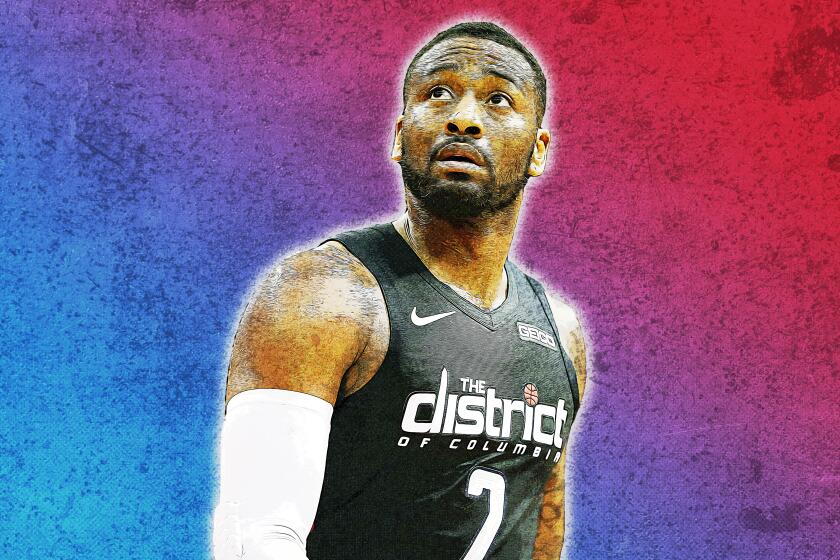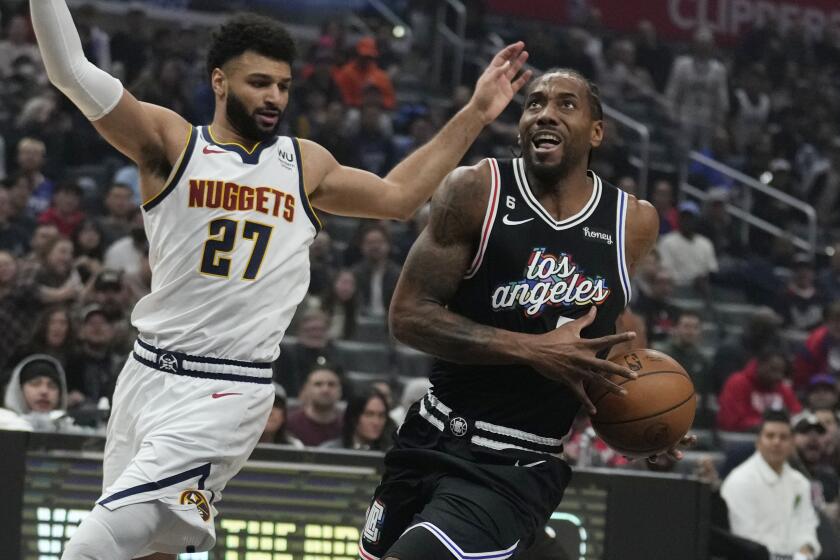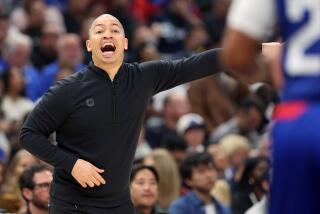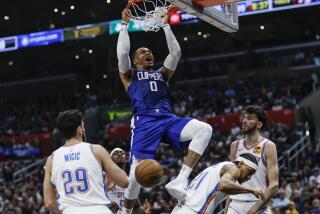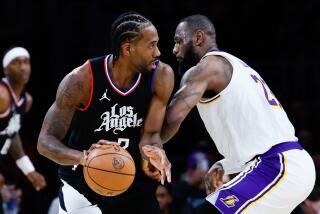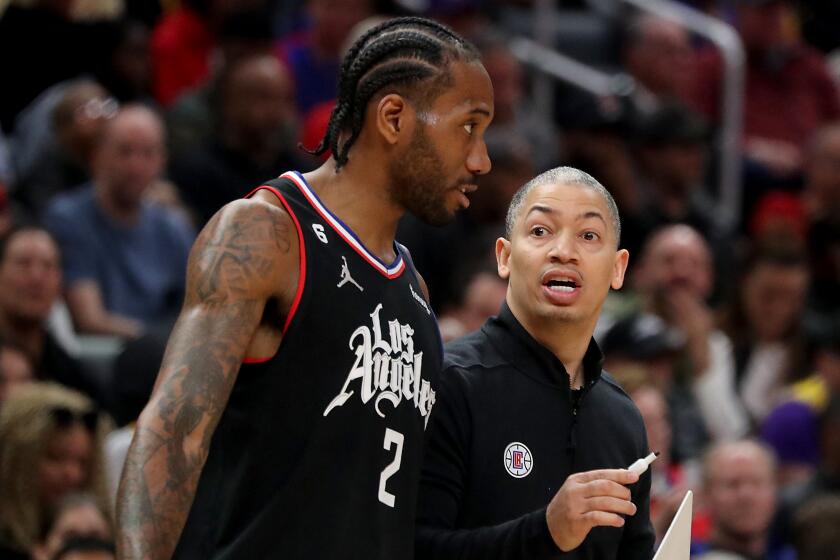John Wall’s up-and-down season mirrors that of Clippers
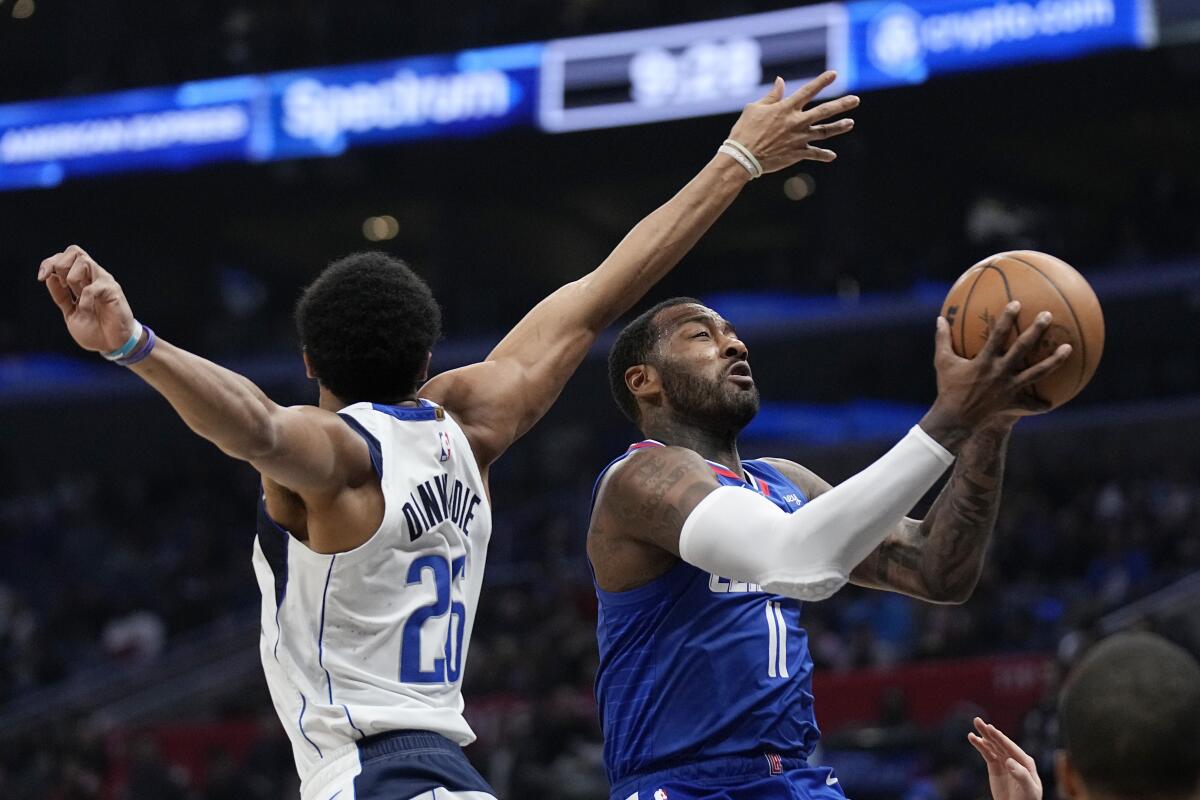
- Share via
Earlier this week, after he had made two of 11 shots against Dallas and played only 15 minutes, John Wall went to a place many might avoid: social media.
Hours after the Clippers’ loss was over, Wall clicked “like” on a series of tweets critical of his play both that night, and during this season.
Luke Kennard taking John Wall’s rotation spot >>>>
Like.
John Wall went 2-11 posting pics of himself from the game like he did something
Like.
He saw it all.
“I love it, it gives me motivation. Now I have another hater,” Wall told The Times after Friday’s 115-103 loss to Denver that drops the Clippers to 22-22. “I have somebody that, ‘Oh, he’s not this, he’s not that.’ Like, I’m not mad at you, you entitled to whatever your opinion is, but I use that and keep it in my notes to fuel me to want to get better and never be satisfied with where I’m at and where I’m trying to go.”
Wall is clear that he is far from satisfied, too. Frustration has followed as he remains limited to about 30 minutes per game, he said, and is unable to play on consecutive nights. Asked to grade himself after 34 games, he chose a “low C.”
Clippers guard John Wall returns to Washington, where he began a stellar NBA career and surpassed that stardom with his benevolent work in D.C.
His season has soared to momentary highs, from December’s hero’s welcome return to Washington, where he spent his first 10 years, to Friday’s poster dunk in transition against Denver’s Zeke Nnaji.
Wall has shot 45% inside the three-point arc, which matches his 11-year career average, and 30% from three-point range, a decrease of his career average. His 17% turnover rate is second-highest on the team, about 2 percentage points higher than the team’s other point guards.
“The season will get better for me,” he said. “It’s tough being on a minute restriction. It’s tough like, trying to figure out guys, figure out what roles you’re going to be. Still frustrated by not getting a lot of, no calls, it ain’t going to never change, I feel like. I think it’s always an excuse. I think we just trying to figure out as a team and as a group and try to get better game by game.”
The up-and-down progress of Wall’s season has mirrored the team‘s. The Clippers have lost eight of their last 11 games entering Sunday’s matchup against Houston at Crypto.com Arena.
“I think the most important thing for us is at times when it gets rough we don’t communicate and the most important thing, Kawhi [Leonard] could probably tell you, Norm [Powell] could tell you because they won championships, is you have to stick together when it gets tough,” Wall said. “And you have to communicate. That’s the key to a lot of success.”
Wall’s dunk over Nnaji is an example of why he remains optimistic. While working out by himself last season, away from the Houston Rockets, Wall developed a regimen that included weight lifting, and he said the Clippers cut back how often he would lift out of concern of the workload on a 32-year-old returning to the NBA after three seasons in which leg injuries limited him to 40 games. He called it “tough” to adjust to that plan initially but said he trusts the medical staff and reasoning. Recently, he said, he has been able to lift more.
“The more you be out there, the more you find a rhythm and a flow, you get to see that,” Wall said. “I think in spurts at times you see it from game to game, but I think just me getting back to doing workouts and stuff like that you’ll continuously see it and see me improve.”
With less than one month until the trade deadline, and less than half the season remaining, one element of intrigue is who will handle the ball outside of high-usage stars Kawhi Leonard and Paul George in the postseason. Does this team with so many wings need a traditional point guard to operate its offense?
“Hell, yeah,” forward Marcus Morris Sr. said, calling a primary ball handler vital to past champions.
Kawhi Leonard is showcasing the power and explosiveness that were part of his game before his knee surgery, but the Clippers still can’t beat the Nuggets.
Longtime starting guard Reggie Jackson has been relegated to the bench, though that is subject to change, coach Tyronn Lue said. His place has been filled by Terance Mann, whom Lue considers more of a small forward. Lue has made clear he prefers to keep a traditional point guard in his rotation even when shooting guard Luke Kennard and George eventually return from injury — “I was a point guard, so I got a soft spot for point guards,” Lue said — and Wall has remained featured in reserve rotations.
The decision has not been met with unanimous approval internally. The Clippers have been outscored by 6.6 points per 100 possessions when Wall plays, and outscored opponents by 1.6 points when he sits. Yet Lue has displayed a trust in Wall, who played 29 minutes against Denver and closed the game in part because Lue said he felt the offense had been too slow getting into its plays.
Both Wall and Lue said they were aware that his offensive role works best when Wall is getting to the basket or avoiding off-the-dribble jumpers early in the shot clock. This season, Wall has shot 34% on catch-and-shoot jumpers. Over Wall’s last eight games that number has jumped to 47%, while his number of pull-up attempts has decreased.
“Just getting him used to playing that style of basketball when he’s been playing a different way his whole career,” Lue said. “It’s kind of tough, but he’s been doing a good job.”
While being candid that this season has been “tough for me,” Wall said he again pledged to adjust to any role asked of him, citing his reaction to his shortened playing time against Dallas.
“Earlier in my career I probably would have been like, ‘Hell, nah, I’m playing the whole second half,’ ” he said, “but got to be able to be true to your role.”
More to Read
Get our high school sports newsletter
Prep Rally is devoted to the SoCal high school sports experience, bringing you scores, stories and a behind-the-scenes look at what makes prep sports so popular.
You may occasionally receive promotional content from the Los Angeles Times.

